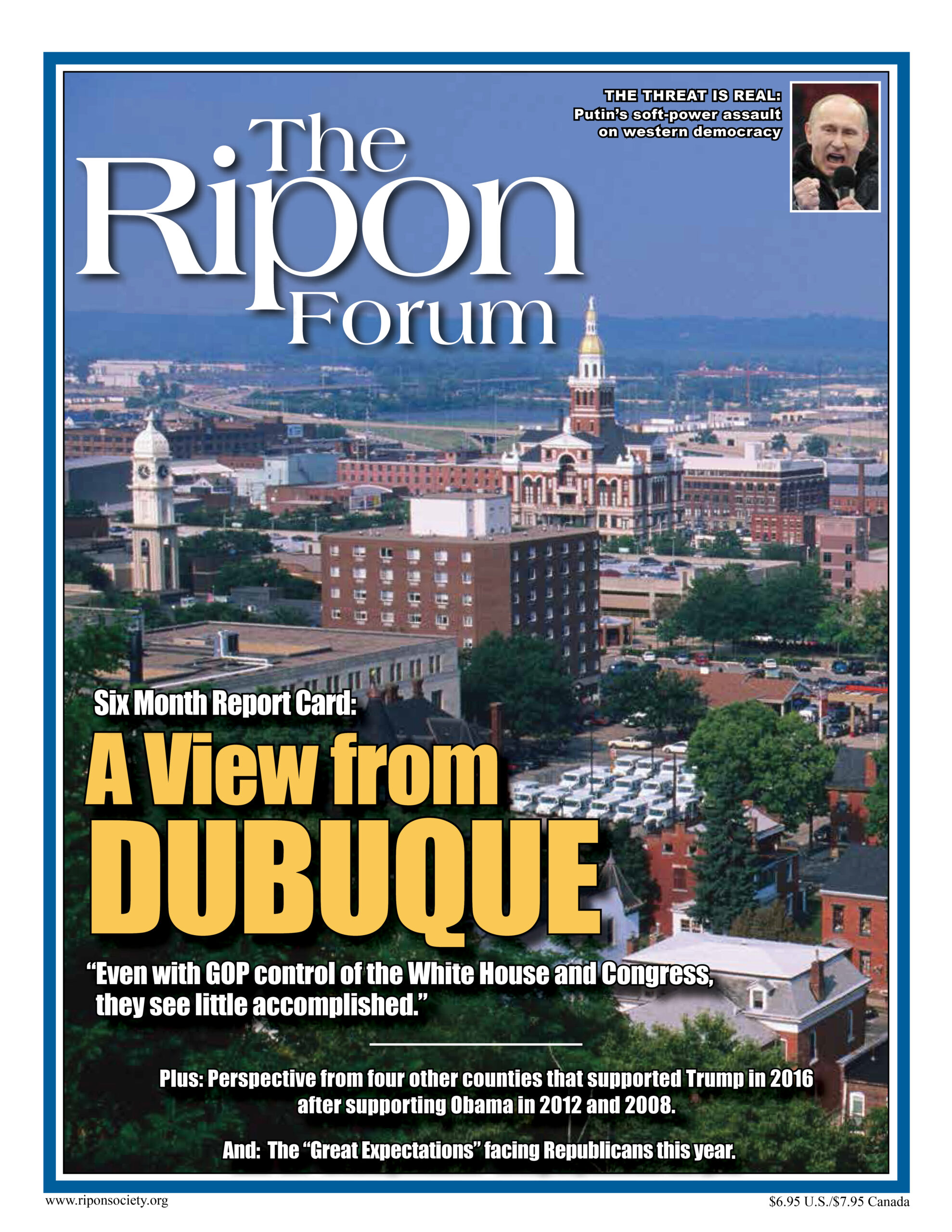 WASHINGTON, DC — To better assess what Americans think about the Trump Administration and Republican control of Congress halfway through 2017, The Ripon Forum reached out to leading political observers in counties that supported Donald Trump in 2016 after supporting Barack Obama in 2012 and 2008.
WASHINGTON, DC — To better assess what Americans think about the Trump Administration and Republican control of Congress halfway through 2017, The Ripon Forum reached out to leading political observers in counties that supported Donald Trump in 2016 after supporting Barack Obama in 2012 and 2008.
“There were 208 of these ‘Obama-Trump’ counties in total,” states Forum editor Lou Zickar, “and they helped define last year’s campaign. They will also help define the Trump Presidency in the months and years ahead – for good and for bad. Indeed, as Muhlenberg College Professor Christopher Borick writes in his assessment from one of these counties, ‘If the Trump electoral coalition does begin to come apart, the canary in the coal mine is likely to be Northampton County, Pennsylvania.’
Other counties featured in this latest edition of the centrist Republican journal include:
- Dubuque County, Iowa — with perspective by Christopher B. Budzisz, the Director of the Loras College Poll, who writes of Dubuque residents: “Even with GOP control of the White House and Congress, they see little accomplished.”
- Trumbull County, Ohio – with perspective by Adam Fuller, Assistant Professor of Politics & International Relations at Youngstown State University, who writes: “There is nothing to indicate the Trump train is being derailed” in the Trumbull County area.
- Macomb County, Michigan – with perspective by Oakland University Political Science Professors David A. Dulio & John S. Klemanski, who write of area residents: “These voters like Trump now for the same reasons they voted for him in the first place — he is not a politician.”
- Kenosha County, Wisconsin – with perspective by Carthage College Professor of Political Economy Arthur I. Cyr, who writes of the area: “While Kenosha County has reflected the Republican trend, there is continuing Democratic support.”
In addition to these six month report cards from these five key counties, the latest Forum also includes an analysis by veteran GOP strategists David Winston & Myra Miller looking at the “Great Expectations” that remain for Republicans as they begin the last half of this year. “Voters gave Republicans an across-the-board win,” the pair writes. “But to whom much is given, much is required. Now, voters expect the President and the GOP Congress to deliver the change they promised. Without it, those same voters may well rock the boat again in 2018 or, at a minimum, stay home.”
To the extent that so much of the unease being felt in Washington these days stems from the fact that Russians interfered in our election last year, the latest edition of the Forum features an essay by Jan Erik Surotchak of the International Republican Institute. Surotchak and his colleagues at the IRI have been investigating this issue for some time. In fact, they have a special name for the investigation — the Beacon Project. As Surotchak writes in his piece, their findings should leave no doubt that, “The Russian Federation is carrying out a sophisticated and opportunistic soft-power campaign to weaken democratic institutions in Europe.” The findings should also leave no doubt that the Russian soft-power campaign last year targeted the U.S.
Another threat of a very different nature is the opioid epidemic sweeping across America. In an op-ed, West Virginia Congressman Evan Jenkins writes about the impact of opioid addiction on his hard-hit home state, and what Congress is doing to bring this crisis to an end.
With Virginians going to the polls this November to choose a new Governor, political expert Brian Schoeneman examines the results of the June 13th primary, and shares his thoughts on how the general election in the Commonwealth could be a bellwether to the 2018 campaign.
In the latest Forum debate, defense experts Daniel Gouré and Doug Bandow square off in a discussion about the size of the U.S. military and whether or not it needs to be larger.
And in the latest Ripon Profile, Louisiana Senator Bill Cassidy discusses, among other topics, the priorities he would like achieve this year.
The Ripon Forum is published six times a year by The Ripon Society, a public policy organization that was founded in 1962 and takes its name from the town where the Republican Party was born in 1854 – Ripon, Wisconsin. One of the main goals of The Ripon Society is to promote the ideas and principles that have made America great and contributed to the GOP’s success. These ideas include keeping our nation secure, keeping taxes low and having a federal government that is smaller, smarter and more accountable to the people.



